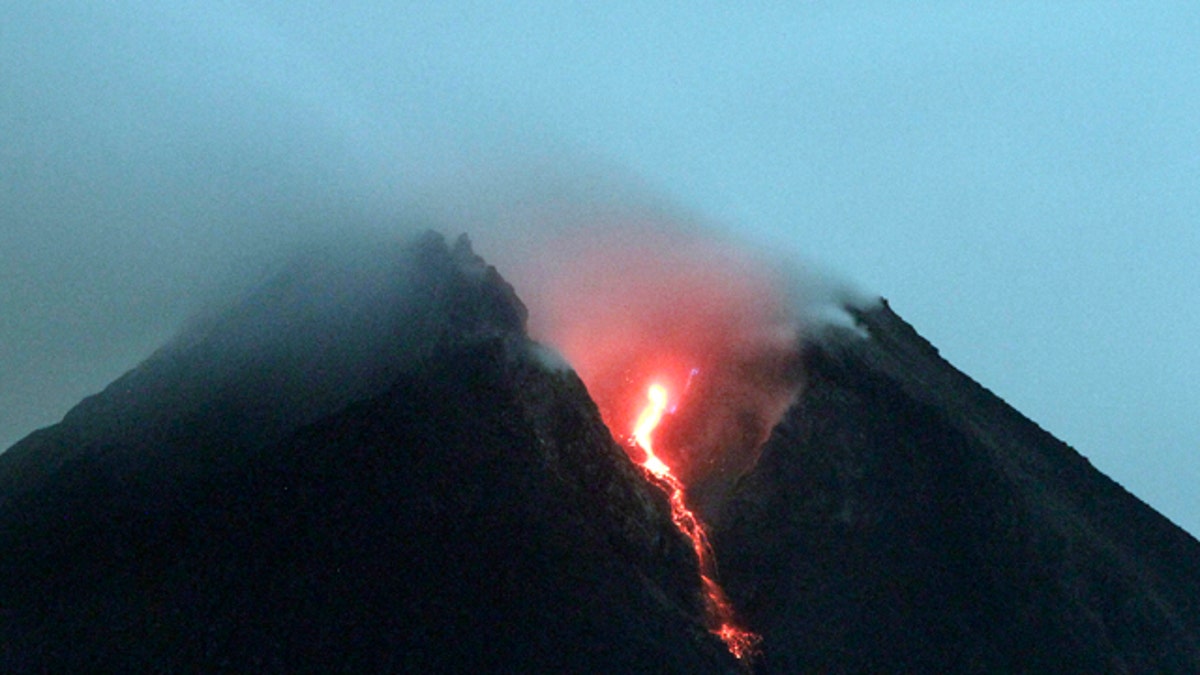
Lava flows from the crater of Mount Merapi as seen from Cangkringan, Yogyakarta, Indonesia, early Friday, Oct. 29, 2010. (AP Photo/Binsar Bakkara)
MOUNT MERAPI, Indonesia – Indonesia's most dangerous volcano forced international airlines to cancel flights to nearby airports Tuesday, as fiery lava lit the rumbling mountain's cauldron and plumes of smoke blackened the sky.
Scientists warned that the slow eruption could continue for weeks, like a "marathon, not a sprint."
No casualties were reported in Mount Merapi's latest blasts, which came as Indonesia struggled to respond to an earthquake-generated tsunami that devastated a remote chain of islands last week. The two disasters in separate parts of the country have killed nearly 470 people and strained the government's emergency response network.
Indonesia, a vast archipelago of 235 million people, is prone to earthquakes and volcanos because it sits along the Pacific "Ring of Fire," a horseshoe-shaped string of faults that lines the Pacific.
Merapi has killed 38 people in the last week and prompted the government Tuesday to order airlines to choose routes circumventing the towering dark ash on takeoff and landing.
Malaysian budget airline AirAsia and Singapore's SilkAir responded by suspending several international flights to Yogyakarta and Solo, both within 20 miles (30 kilometers) of the crater and popular hopping points to the famed 9th century Borobudur temples.
Both airlines expected to resume operations soon.
There have been more than 10 large eruptions at Merapi since the first big explosion on Oct. 26, including a violent burst Monday that appeared to ease pressure inside the crater by creating a vent for magma to escape.
Three much smaller eruptions followed Tuesday.
"There's no way of knowing for sure, of course," said Safari Dwiyono, a volcanologist who has observed the mountain for more than 15 years. "But based on what we've seen in the last few days, we're hoping there won't be a massive explosion. It's looking like we're in for a marathon, not a sprint."
The nearly 70,000 villagers evacuated from around Merapi's slopes have been told their stay in crowded government camps could last at least three more weeks.
More than 800 miles (1,300 kilometers) to the west, aid was being ferried to the most distant Mentawai islands, where last week's tsunami destroyed hundreds of homes, schools, churches and mosques. The tsunami death toll stood at 431, the National Disaster Management Agency said.
The fault line that spawned the killer wave -- and the 2004 Indian Ocean tsunami -- is the meeting point of two of the Earth's dozen major plates, which have been pushing against and under each other for millions of years, causing huge stresses to build up.
The government has raised alert levels of 21 other volcanos to the second- and third- highest levels in the last two months because they also have shown an increase in activity. That's twice the number usually on the government "watch" list.
Hundreds of flights were canceled in Europe after the eruption of Iceland's Eyjafjallajokul volcano in April.








































